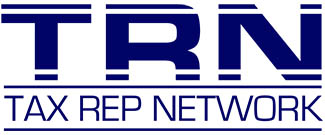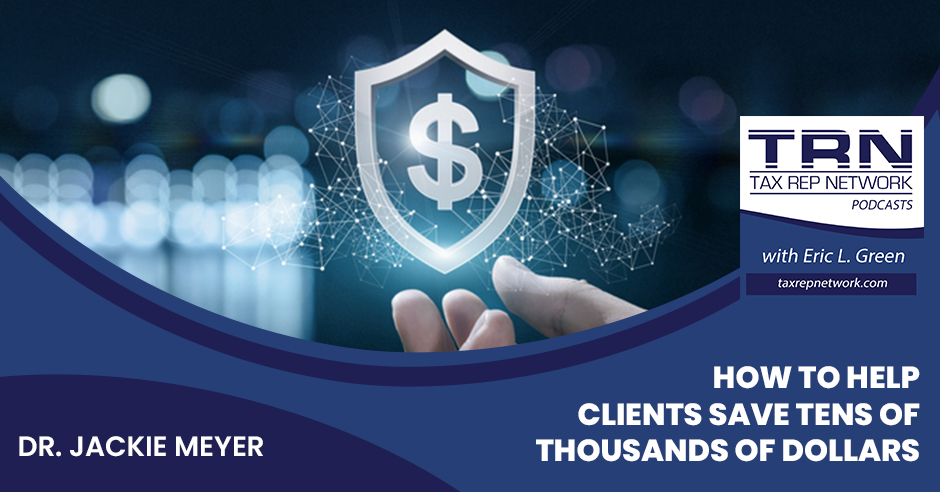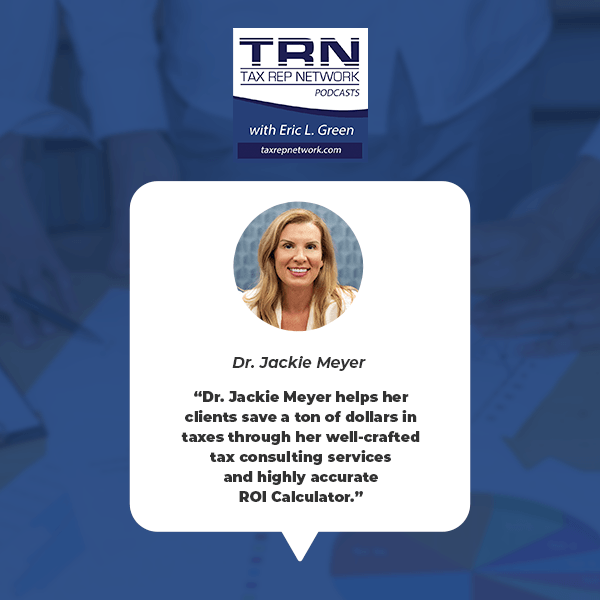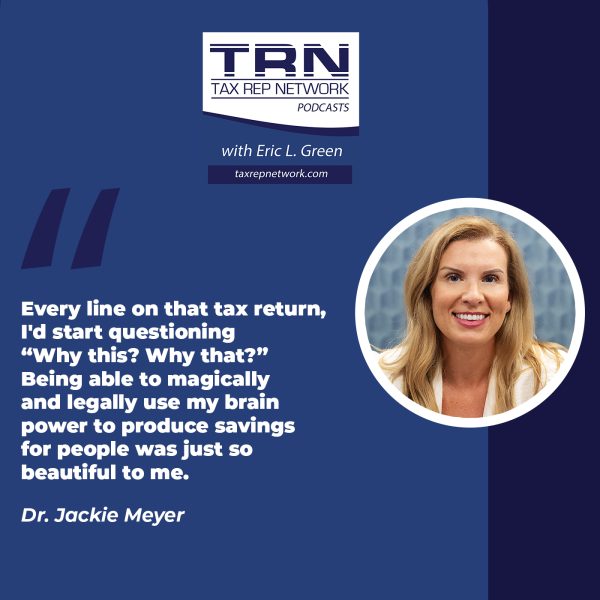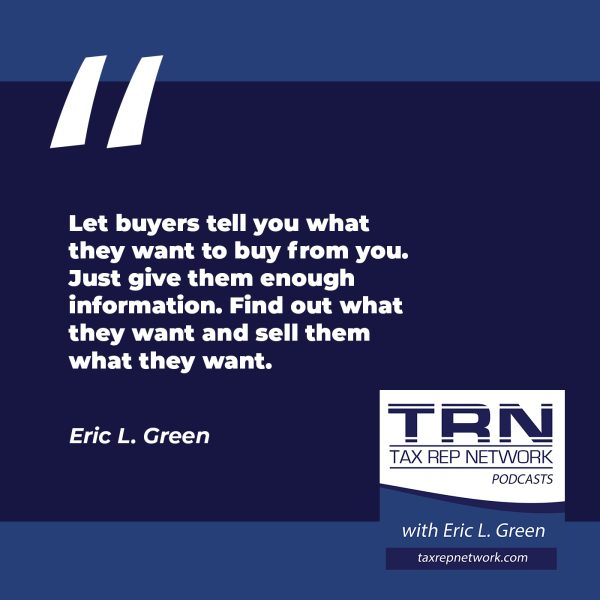Help clients save tens of thousands of dollars in taxes! Joining Eric Green on this week’s podcast is CPA and Tax Plan IQ founder Dr. Jackie Meyer. She explains how their tax consulting works, how the ROI sells itself, and how to use it best to maximize your practice and end the squeeze of cheap fees. If you want to try it out and see for yourself, Dr. Jackie’s ROI Calculator can be found here.
—
Listen to the podcast here
Watch the episode here
How To Help Clients Save Tens Of Thousands Of Dollars With Dr. Jackie Meyer
Thanks for joining us on this episode. We’ve been trying to get this together. Usually, it’s been me that’s been unable. We have not been able to work this out, but I am joined by Jackie Meyer. Many of you probably already know her. If you don’t, she’s a CPA. She’s the president and founder of Meyer Tax Consulting LLC. She launched TaxPlanIQ. She has an ROI calculator, which we want to get into talking about both of those things, and concierge accountant coaching programs in South Lake, Texas.
She specializes in tax planning for executives that provide a high return on investment. She’s a certified tax coach and has a completely virtual team, which is also a topic we have discussed on this show and one that is the wave of the future. Quite frankly, I don’t think that’s any big news to anybody. She began her career at Countrywide, obtained a BS in Finance at the University of Texas in Arlington, and ended up having a zeal for taxes.
She went to work at Deloitte, as well as KPMG while pursuing her MSA at Southern Methodist University. She is married to Mark and has two children, Gabe and Alexandra, and two large dogs, which are like kids. She built the tax planning platform TaxPlanIQ, which has helped over 800 firms save their clients over $1 billion in taxes.
You forgot about my doctorate in leadership. It’s Dr. Jackie now. I have three dogs and two cats now too.
What Led Dr. Jackie Meyer To Tax Consulting
I see that a lot happens when we spend months and months trying to get something. You got another dog, cats, and a doctorate. It’s the underachiever part. Anyway, thanks for doing this. You’re an interesting person. There are interesting things to talk about. For everyone, what led you to realize in terms of the consulting? There are lots of tax prep people. They have tax practices and they do returns.
I’ve had Dawn Brolin on. We’ve talked about relationship pricing and focusing on clients that you can help plan for and do for. You seem to have grabbed onto that early on. What was it? Was it working at Deloitte that led you to it? Was it something you always knew? What led you to realize that consulting and coaching were where it’s at?
I’ve looked back on this a lot to figure out how all the pieces come together and I think it finally has. My undergrad was in Finance. Maybe I should have been a financial advisor, but I started working for one who was also a CPA in Fort Worth, Texas during my undergrad. I thought I’d be learning financial advisory stuff. He measured it based on moon phases, which isn’t my deal. He also had me start doing tax prep, which I fell in love with because I’m one of those existential people who are constantly questioning the why. Every line on that tax return, I’d start questioning, “Why this? Why that?”
Not being raised with a lot of money, and being able to magically and legally use your brainpower to produce savings for people was so beautiful to me. That’s how I fell in love with it. I went back and got my master’s in Accounting and then started working at Deloitte. Deloitte did not lead me down any positive path whatsoever, I’ll tell you that. I made my way to starting my own firm and dove in.
It was a traditional practice until I hit this burnout phase that a lot of us do. I was like, “I’m done with this. I’m going to do my own thing. I’m going to be innovative.” I started leading with tax planning. I wouldn’t take a client or keep a client I couldn’t do tax planning for. I thought, “Why can’t I measure the return on investment that I’m getting these clients?” You analyze the AICPA code, you figure out this dumb contingent fee rule stuff, and you work around it, and figure out how you can value price up front and still measure value. That’s what I did.
I agree with you about Deloitte. What it made me realize is I never want to work for one of those large firms ever again, which is the opposite of what they’re telling you in the accounting program. I was old enough that they used to discuss the Big Eight. That was the ultimate. You go to the Big Eight. I remember years ago, I ran into one of my professors from undergrad, and we were talking. I said, “Did you like your time there?” He was at the old Coopers & Lybrand. He said, “No, I hated every minute of it.” I’m like, “Why are you there?” He said, “I admit it. It’s a great place to start. It’s a great thing to have on your resume because from there, you can go anywhere.”
One of my top first clients found me on Google Maps, this high-net-worth executive in South Lake, Texas. He saw I worked at Deloitte and he’s like, “I’m going to work with her.” That alone does help.
There is some cache to it. There’s a whole bunch of things that you hit on. One is, to me, it seems you have these skills. If you’re just doing a return, in other words, the person shows up in February, gives you their stuff, and now you’re doing a return, with the time, I never found pleasure in that. I got that we’ve implemented these strategies, and now to see how it impacts the return is very cool.
Where To Find Software Ideas
Back then, they would make you do it manually, even though the software had come out. I believe this. You will learn better because now you understand how each schedule impacts the return. You have to do this and bring the number over, whereas the software moves stuff around. A lot of that gets lost if you’ve only been trained on software and don’t understand how everything impacts that return. You start doing this. You’re finding clients that you can do the consulting with and the planning for. Where do you get the idea for the software?
The software naturally was part of the path that I gravitated toward. I’ve always been a tech geek. People are astonished at the thousands of apps on my phone. I’m constantly testing new apps and am very innovative about things. I had a lot of success when I changed my firm around, and I got asked to start speaking at QuickBooks Connect and other conferences around it. That naturally progressed to coaching accountants.
I started mastermind programs with my coach, Chuck Bauer, and we coached about 300 accountants toward tax advisory and bettering their firms, which was fun. One day during COVID, everyone is scrambling to go paperless and remote. I’d already done that in 2022 when I started my firm. I went to one of my software vendors and I’m like, “I’m bored. Could you take this idea I have? I’ll pay you a royalty on it so that I don’t have a huge upfront investment,” which is great.
As a female founder, I don’t get the VC access and whatnot that some others do. They said yes. We created this product. It didn’t grow nearly as quickly as I wanted it to, but we’re at almost 500 users four years in, and it’s successful. It was a combination of everything that I learned in my own practice that’s filling in these new gaps in the tax advisory marketplace that don’t exist in other software.
Tax Rep Network began with how you get work as an attorney. You invite in the accountants, give a talk, and they refer cases. I had a CPA come up to me one day after one of the talks and he said, “I would pay you if you would teach me to do this.” I created an eight-hour training program. You don’t know if it works, so you have to try it. I invited in a couple of EAs, a couple of CPAs, and a couple of attorneys, got feedback, and then started running programs. I charged and it grew. It’s now this large online community helping people do rep work. I get that. I fell into it. I didn’t plan to go out and start a training program, but it flowed from what I was already doing.
Being a technician is so win-win, being able to bring that to the table. I’ve heard so many great things about your network. Angie Toney is one of our TaxPlanIQ users. She is in love with all the stuff you do. I hear about it constantly. Kudos to you for creating such an amazing thing.
What happens and what comes through is you want to help people. That comes out. I do have some competitors. What I will hear from members is, “They didn’t want to deal with me. They wanted my money.” At the end of the day, you approached them and they weren’t very approachable. She said, “You are. You enjoy doing this and you enjoy teaching.” I contemplated becoming a professor. I’ve done this for ten years. Maybe I should get off the treadmill. Tax Rep has enabled me to do that and spend time teaching.
What comes through with you too is you want to help people. People want to work with people who want to be there. I get why people are attracted to this, aside from you enabling them to do something that I would imagine most tax pros innately understand. Even if they’re not doing planning, they have the ability. They’ve got the knowledge. They just have to apply it. If you’re tuning in to this, you should go check out what Jackie is doing, because you need maybe a little help and some of the tools, but you can do this. It’s just changing your approach and how you think about it. In a way, you’re already doing it. You probably don’t even realize you’re doing it.
Questioning each thing, questioning everything, asking the right questions of the client, or asking the client questions is always a great start.
Questioning everything and asking the right questions to the client is always a great start in tax consulting. Share on XEspecially in my field, asking the client questions that might be a little bit uncomfortable. People come to me with payroll tax problems. There’s a very obvious question, “Why can’t you pay the payroll taxes?” If you hire people who can’t afford to pay the taxes, there is something wrong with your model. It might be fixable, but it has to be dealt with.
Tax Plan IQ Learning Curve: Client Mindset & Implementation
When you start asking this, I have plenty of clients who get agitated about it because I’m asking questions they don’t want to answer. Many of them will know innately, “I know that I can’t afford this,” but they don’t want to make the difficult decision of letting people go or maybe charging more to clients or whatnot. When folks do start working with you, TaxPlanIQ, and whatnot, do you find there’s a learning curve? Aside from the tech aspect of figuring it out, is there a learning curve? Is there a state-of-mind issue that they need to get to, or are they already there by the time they come to you?
A lot of times, they’re already there. There would have been a learning curve when I first created TaxPlanIQ because I created it for experienced tax advisors, but we had to completely remodel that because there were not enough experienced tax advisors. We had to change the program so that it automates suggesting strategies.
You upload a PDF of 1040. It suggests over 50 strategies off of that, from very basic stuff up to alternative investments, credits, and things and whatnot. It’s different now than it was if someone tried it 3 or 4 years ago because I’ve completely transformed and made it easy plug-and-play. You might disagree with this, but I would almost challenge the assumption that you have to understand tax prep to even do tax advisory anymore.
I agree. What I’m thinking is if you are doing tax prep, this is a natural next step. This is not very popular, but my tax prep members tend to agree with me. Remember the commercial that Intuit ran during the Super Bowl, “Get rid of your tax pro?” It was crass, but it was honest. Pharmacists, that’s the industry that comes to mind. How many independent pharmacists do you know? They all work for Duane Reade, Walgreens, or CVS. I think Walgreens bought Duane Reade. It’s Walgreens or CVS.
What I’m watching is that very big firms are buying up any of the smaller firms that are good. They have good clients and are charging appropriately. We have a number of people, probably your folks and my folks, who are upscaling their practice, tax consulting, representation, forensic accounting, and financial planning. All of the people who are knocking out returns, I think that many of those people, the older people are going to retire. The younger folks are going to become the line people for Intuit and the software companies.
That’s where the jobs are going to be because of AI and the rest. I’m not all doom and gloom. If you have a tax prep practice, I would challenge you, you have a couple of years to figure out how you’re going to go from tax prep, knocking out cheap returns like H&R Block, to elevating yourself to tax consultant. That’s why I was so eager to have you on because I would tell you, that the tax rep or the network is an off-ramp, and so is yours.
For folks who go into consulting, start working with small businesses. By the way, more of the population is going to become self-employed. We are going to move to a world that is not exactly, but closer to LinkedIn. What I mean by that is I went to a talk years ago at NYU, probably 6 or 7 years ago now. The talk was about the future state of the digital workforce. They argued the days of big firms hiring you, training you, providing all the infrastructure and everything, your benefits, whatever, those are going to become few and far between. People are going to end up having to become an army of one.
Jackie is going to have her own practice. She’s going to have to be her marketing person, her payroll person, her benefits person, whatever. How are you going to operate? Think about LinkedIn. Let’s say I have a project. I could take space, hire staff, do all that, or I can go on and say, “Jackie, I got this project. Can you come in and help me? Greg, Jeff, whoever, I have this project.” You can pull together the people you need. When a project’s over, everyone is off doing their own thing again.
They call it the world will become LinkedIn effectively. Your network is how you’re going to get anything done. The thing is it puts the burden on you. I think that for the folks tuning in, I would take 2025 as the year that you’re going to start implementing change. You’re going to start getting up to speed and putting consulting in place or rep in place. If you want to go get your forensic, you’ll become a fraud examiner. It’s great. They charge more per hour than I do, and we need them. I have no choice but to bring them in. Go get that. Go get the designation you need.
This is the year to upscale everything. I think of tax consulting. What you do, Jackie, is such an easy add-on to an existing tax pro. They don’t have to change anything. They can add it in. What they’ll find is they’re going to decide, “Now, there are certain clients that I don’t want to work with anymore because I want to get people they can consult with.”
Here’s a fun fact. On industry average, one tax plan replaces 22 tax prep clients on average. Pick one client you know you haven’t been doing as much as you should have. We all had those in a traditional practice. Go to them and say, “I think I can do more for you. I’d like to analyze your situation, ask a few questions, and value price this for you upfront. Are you open to that?” They’ll be like, “Heck, yeah. I want this. This is a service I want and everybody needs.” Don’t pick a PITA. Just pick a nice client.
I’ve had Dawn Brolin on. We talked about this two weeks ago when she was in the program. You pick your five best clients, and you go and you get them involved. You now have them in relationship pricing or a membership. Before you know it, you’ll have 20 or 25 good clients. You don’t need the others. The PITA folks are the ones you’re going to send that letter to saying, “Unfortunately, due to our growth, we are no longer able to properly handle your account. You have your original documents. Here’s a list of some other practitioners in the area. Good luck in finding your next accountant.”
Don’t let the door hit you in the tush on your way out because they’re not worth it. They’re not worth the time. They don’t want to pay what you’re worth. I think that it’s an obvious way to implement it. By the way, for folks who are new to this tuning in to this, is this something you can help them with? If they come to TaxPlanIQ, is there consulting, or do they just buy this program?
We released a consulting program. It’s called our Growth Membership. We offer up to five hours of CPE per month for up to five users baseline in a firm. You can pretty much almost get all of your CPE for the year through us. Every month, we do How to Sell Tax Plans, How to Start Tax Planning, and How to Implement Tax Plans. We have guest speakers. We do a monthly tax theme topic. We did capital gain deferral or elimination strategies. We have added a “no way to fail” move to tax advisory because everyone seems to struggle with a little bit different aspect of it. Some people might know the technical but don’t understand sales, or vice versa. We’re filling in those gaps, and it’s a tremendous resource.
Understanding ROI And The Tax Plan IQ Calculator
It’s a no-brainer. Not only do you have the program, but you have the training on how to implement the program. I’m fascinated. You have an ROI. Walk us through this. Explain what it is. I know what ROI is, but explain what the calculator is.
It’s simple. If you think about it, people have been saying, “Go to value pricing, go to value pricing, go to value pricing,” for decades now. Ron Baker would say since 1989, he’s been advocating for this. I have a true calculator, like a measurable calculator. That’s what any accountant wants, to be able to measure that math. It’s in Excel. It’s free. We’ll put the download in the show notes for sure for everybody. You essentially visualize the tax savings or advisory savings you can do for a client. Even if you’re doing outsourced CFO service or maybe tax prep work. It can apply well to a lot of what your members are doing.
You say, “I think I can find $50,000 a year of tax savings here.” Let’s measure four factors, the complexity, the engagement, the urgency, the risk involved to the accountant, and what I call intangible benefits, like white-glove service or unlimited email support or whatever makes you special that the accountant down the street doesn’t do. Based on those high, medium, and low factors, it produces a price that gives them a great ROI. That could be a 200% ROI minimum. That could be a 1,000% ROI minimum. It’s up to the firm. Some people are a little shocked at how high some people price, but it works. The higher your price, the higher-quality work you’re going to produce for the client. It’s more win-win for everybody. That’s the calculator.
The higher your price for your services, the higher the quality of work you will produce for the client. It is a win-win situation for everybody. Share on XI talked with Paul Hamann. I don’t know if you know Paul, the founder of RCReports.
Yeah. I love Paul.
It set me off, and my members should know better. I had members who said to me, “My clients don’t want to pay for a reasonable comp review.” I was like, “Time out. Back up. You’re not going to call a client and say, ‘You need to pay for this report.’ By the way, we’ve never done this before. I’ve been doing your return for years, and now all of a sudden you have to pay for it? Wrong.”
Instead, I’m going to put the client’s basic info in. Yeah, we have to fine-tune it a little bit but put it into RCReports. If they’re making $160,000 a year as an LLC and their reasonable comp comes in at $90,000, I’m going to call the client. I’m not going to say, “You need to pay for this.” What I’m going to say is, “If I could save you $10,000 a year, you end up with an extra $100,000 or $120,000 plus growth over the next decade. Are you interested?” The client’s going to be like, “How quickly can you get here?”
Here’s what we’re talking about. If we convert you to an S-corp, we’re going to have to put payroll in place unless you already have it. We have to run the report every December. The software costs $1,500. That’s $1,500 a year. Instead of an LLC, you’re going to be spending $2,500 on an S-corp. There’s another $1,500 above what you were already paying. It’s going to cost you an extra $3,500 a year. I’m calculating savings of $70,000 times 15.3%. I’m calculating savings of around $11,500. You’ll end up with about an extra $8,000.
With the return and everything, I think we should be able to put an extra hundred thousand in your pocket. My suggestion is to set up a profit-sharing plan and put that money away because we are going to reduce your earnings for Social Security. Honestly, and not to get political, I think you’re better off with the money in your profit-sharing plan than hoping you’ll get Social Security later.
Every single client would be like, “Sign me up. I love this idea.” You’ve sold them the annual report. You created an annuity from the software. You’re saving your client money. You’re bulletproofing that issue for them because, with that report, the IRS doesn’t challenge it. You give them that report, and that issue is off the table. They don’t have better info than that. You’re the hero.
By the way, because I now have TaxPlanIQ, I bet there’s another 25,000 of other stuff we can save you. You don’t go to sell them, you have to pay for a report. Bad approach. What you’re going to say is, “I can save you X. Are you interested in us working together to see if we can do this?” You don’t say, “I could give you something, you have to brush your teeth and go to the dentist.” What you say is, “Would you like the candy?”
If the cost-benefit is not there, then don’t do it. You described exactly what our method and TaxPlanIQ are all about. It’s just compiling. A reasonable comp is one of the 130-plus strategies. RC Reports is one of our preferred vendors. That’s one line item on this report of 5 to 7 strategies that you’re pulling together for the client and making sure that cost-benefit is there. The thing is that most people aren’t necessarily as great with numbers as we are. Plus, people prefer visuals over verbal explanations. Having that visual report sells itself. It’s amazing. You barely have to say anything, which is great for accountants because we hate to sell.
Most people are not necessarily as great with business numbers. They prefer visuals versus verbal explanations. Having a clear visual report sells itself. Share on XSome folks will sit here, and I get this every now and then, “Don’t you feel bad charging that?” No, I don’t. First of all, in the old days, 30 years ago, I would call a client and be like, “I think we can save you money as an S-Corp. We’ll set up a salary. What’s your highest-paid guy doing?” “They got $50.” “We’ll give you $55.” By the way, that is a very bad idea. The courts do not come down on that.
Don’t do that anymore.
Before RC Reports existed, who was going to pay for a study? Nobody. That’s what we were doing. I might feel a little bad about that because now I’m giving them savings by pulling stuff out of the air. Now, you show up, you give them the report, and it’s a win-win-win. It sells itself. It’s all about the approach. This is where you have to change your mindset.
That’s what I love about TaxPlanIQ. This isn’t about trying to convince someone or trying to sell somebody. For people in sales, I don’t know if you’ve ever seen Jordan Belfort, the Wolf of Wall Street, interviewed a lot. In the movie, they had the thing, “Sell me this pen.” The person sits there and says, “This is a great pen.” He got interviewed and he said the point of the pen thing is that people who aren’t salespeople are going to try to sell him a pen.
What kind of pen do you like? Are you a very expensive pen? Is it an image or is it more of the throw-away kind of thing? Do you want to make sure they’re in the bag, the car, or the glove compartment? He said, “What you’re going to do is let them tell you what they want to buy from you. You give them enough information. They’re going to tell you.” He said, “I’m going to sell them what they need. Find out what they want, and then sell them what they want.”
The point here is this isn’t like, “You need to pay for this.” It’s “I think we could save you some money. Do you want to spend some time and go through this exercise? Let me show you what I think we can do.” It sells itself. For me, it’s a little bit different. Clients come in here. They’re in trouble. All I need to sell them on is that they’re in the right place because we can do this. They’ll ask me how much I’m going to charge. People don’t tend to balk at my fees. They need me. They don’t need it, so why do they need it? It is because Jackie’s here to show them, “Here are some opportunities. We think we can save you a bunch of money. Are you interested?”
It’s a lot of fun, too. The clients aren’t scared. You can be as aggressive or conservative as they want, or as you want to be within legal parameters. It’s a lot of fun to be able to say, “I can save you this much in taxes. Let’s do this.”
It’s the same when I solve someone’s problem. It’s funny. Once, you know how McDonald’s has billions served or whatever? My former senior partners when I was an associate said, “Can we get a sign of how much money we’ve screwed the government out of?” They were like, “I hear where you’re going, but no. That would be a bad idea.” It is. First of all, on our side, you’re making more money. You’re working with clients who appreciate you and who you want to work with.
For them, you’re saving them money. You’re giving them peace of mind. You’re now the advisor, even if they didn’t realize they need it, they need it. Versus just you doing a return and giving them a postmortem after the fact. By the way, I believe you will become a better tax prep person because you do the planning. You will start to see things on the return differently. I look at returns much differently now when I was having battles with the IRS than I did 25 years ago when I was doing however many returns a day. I know returns better now than I ever did then.
It makes sense.
How To Get Started With Tax Plan IQ
In that sense, because I’ve got the testimonials from some of my members, I finally feel like a real tax professional. I don’t know if that’s because they feel that they’re not intimidated by the IRS or whatever. By doing some of the planning, you will learn the return and the impact of things because you’ll be thinking about it differently. Jackie, how can folks get started? Do they go to TaxPlanIQ and sign up? If you’re tuning in to this being like, “I like this idea,” how do they get started?
Come to TaxPlanIQ.com. We have some great skilled business development people who can show a demo of that growth plan or the regular subscription, depending on what people need. We have a newsletter that about 18,000 people are subscribed to. That’s always a great thing to do from our website as well. On LinkedIn, I tend to post every day, trying to bring a lot of value there to encourage people to move to tax advisory. You can always find me there, Dr. Jackie Meyer, CPA.
Key Takeaways For Tax Professionals
Any final thoughts before I let you go in terms of the tax pros tuning in to this?
I would reiterate exactly what Eric said. This is your year, whether it’s for negative factors like feeling squeezed the most with AI and other things, or positive factors that you finally want to bring so much more value to your clients and you’re ready to make that jump, it is so worthwhile. It becomes the practice of your dreams, and it becomes so profitable. It’s so win-win. I can’t even describe how much it changed my own life, my family’s life, my clients, and my team. I hope that you look into some advisory services and make that leap.
I concur. There’s a lot of opportunity. Now, to get into the down and dirty, the tax law changes are going to favor entrepreneurs because of the Republican Party and the President. The 17 Act are going to be favorable to business owners and entrepreneurs, not wage earners. The IRS is going to accelerate, especially if stuff starts getting cut.
Enforcement is still there, it just becoming automated. The need to get trained is all the better. Forensic accounting is in high demand. This is the year to make your move. This is the year to automate aspects of your practice. Go to TaxPlanIQ and start rolling in the consulting. If you want to add CFO services or rep services, do that. 2025 is a great year if you’ve been playing footsie or sitting on the sidelines to finally jump in. Go check out TaxPlanIQ and connect with Jackie online. I think it’s an easy obvious add.
Thank you so much, Eric. I appreciate you having me on.
I’m glad we finally got to do this. There’s a whole other show we have to do because I want to talk more about the ROI calculator and the approach to clients. There are so many rabbit holes we can go down. It’s a little overwhelming, but I’m glad we pulled this off finally. Jackie, thank you for doing this. Everyone, thanks for tuning in. I’ll see everyone on the show. Bye-bye.
Important Links:
- Jackie Meyer on LinkedIn
- Meyer Tax Consulting LLC
- TaxPlanIQ
- H&R Block
- RCReports
- ROI
- Eric Green on LinkedIn
- Tax Rep Network
About Jackie Meyer
Jackie Meyer is a passionate resource and coach for accounting firm owners, guiding them through a proven process to build businesses they love. With years of experience in the accounting and tax planning industry, Jackie understands that accountants and tax planners are not just numbers crunchers—they are strategic thinkers who provide immense value to their clients.
Having built her own firm from the ground up, Jackie knows the challenges that come with growth. What started as exciting victories in the early days of her business quickly turned into the realities of running a company: serving clients, growing a team, and building effective systems. Jackie recognized that the success of any firm requires not only technical skills but also the ability to operate the business itself, a balance not always taught in finance or accounting programs.
Through her journey, Jackie learned valuable lessons from both her mistakes and successes. Now, her mission is to share these insights and best practices with other accountants, helping them avoid burnout while building successful and fulfilling businesses. With a focus on creating practical solutions and empowering others, Jackie Meyer is dedicated to transforming the lives of accountants and tax planners, one firm at a time.
